Related Research Articles
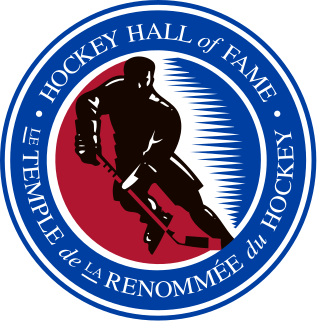
The Hockey Hall of Fame is a museum and hall of fame located in Toronto, Ontario, Canada. Dedicated to the history of ice hockey, it holds exhibits about players, teams, National Hockey League (NHL) records, memorabilia and NHL trophies, including the Stanley Cup. Founded in Kingston, Ontario, the Hockey Hall of Fame was established in 1943 under the leadership of James T. Sutherland. The first class of honoured members was inducted in 1945, before the Hall of Fame had a permanent location. It moved to Toronto in 1958 after the NHL withdrew its support for the International Hockey Hall of Fame in Kingston, Ontario, due to funding issues. Its first permanent building opened at Exhibition Place in 1961. The hall was relocated in 1993, and is now in Downtown Toronto, inside Brookfield Place, and a historic Bank of Montreal building. The Hockey Hall of Fame has hosted International Ice Hockey Federation (IIHF) exhibits and the IIHF Hall of Fame since 1998.
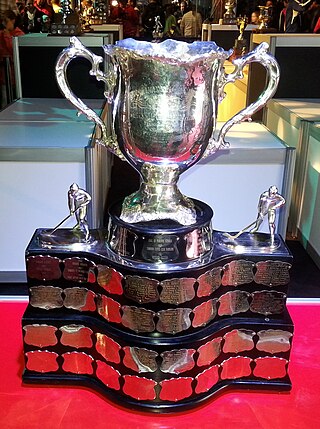
The Memorial Cup is the national championship of the Canadian Hockey League, a consortium of three major junior ice hockey leagues operating in Canada and parts of the United States. It is a four-team round-robin tournament played among the champions of the Ontario Hockey League (OHL), Quebec Maritimes Junior Hockey League (QMJHL) and Western Hockey League (WHL), and a fourth, hosting team, which alternates between the three leagues annually. The Memorial Cup trophy was established by Captain James T. Sutherland to honour those who died in service during World War I. It was rededicated during the 2010 tournament to honour all soldiers who died fighting for Canada in any conflict.
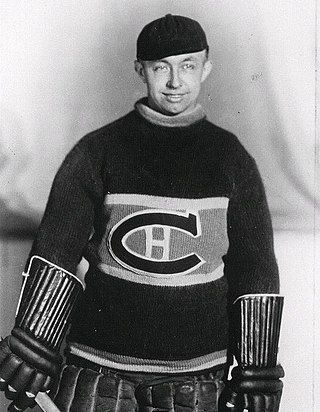
George Henry Hainsworth was a Canadian professional ice hockey goaltender who played for the Montreal Canadiens and Toronto Maple Leafs in the National Hockey League, and the Saskatoon Crescents in the Western Canada Hockey League. He was inducted into the Hockey Hall of Fame.

Edward William Shore was a Canadian professional ice hockey defenceman, principally for the Boston Bruins of the National Hockey League, and the longtime owner of the Springfield Indians of the American Hockey League. Iconic for his aggressiveness, toughness and defensive skill, he was called "The Edmonton Express." In 2017, Shore was named one of the '100 Greatest NHL Players' in history.
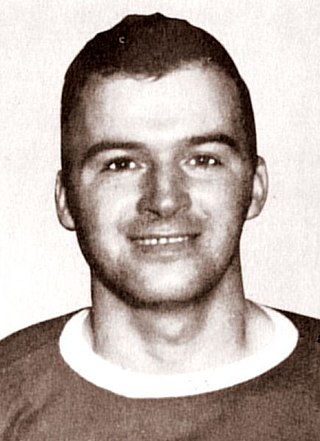
Gordon Arthur Drillon was a Canadian professional ice hockey player. He was born in Moncton, New Brunswick, Canada. From 1936 through to 1942 he was part of one of the National Hockey League (NHL)'s most prolific scoring lines as a member of the Toronto Maple Leafs. He won a Stanley Cup during the 1941–42 season, and was inducted into the Hockey Hall of Fame in 1975.

The Whitby Dunlops were a Canadian senior ice hockey team in the team in the Allan Cup Hockey league. The team began play in 2004, and is on a leave of absence as of the 2020–21 season.

The Red Tilson Trophy is awarded annually by the Ontario Hockey League to the most outstanding player (MVP) as voted by OHL writers and broadcasters. It was donated by The Globe and Mail, and first awarded in the 1944–45 OHA season by the Ontario Hockey Association. The trophy is named for Red Tilson, who played for the Oshawa Generals, and died during military service in World War II. Winners of the Red Tilson Trophy are nominated for the CHL Player of the Year award. The Red Tilson trophy resides in the Oshawa Sports Hall of Fame, in the Tribute Communities Centre.

Captain George Taylor Richardson was a Canadian ice hockey player, businessman and soldier. Richardson played hockey for Queen's University and the 14th Regiment of Kingston, and was considered one of the finest amateurs of his time. He is enshrined in the Hockey Hall of Fame, and is the namesake of the George Richardson Memorial Trophy. Richardson was part of a prominent business family that owned and operated a grain processing business in Kingston, Ontario. He joined the Canadian Expeditionary Force in the First World War, and died in action in Belgium.
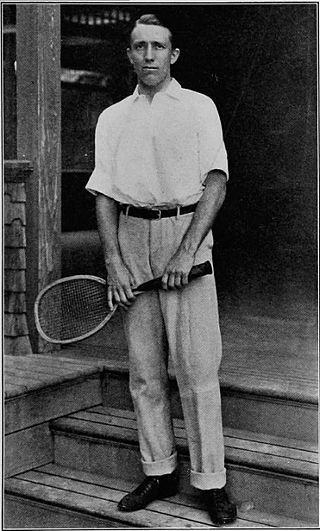
Robert Duffield Wrenn was an American left-handed tennis player, four-time U.S. singles championship winner, and one of the first inductees in the International Tennis Hall of Fame.
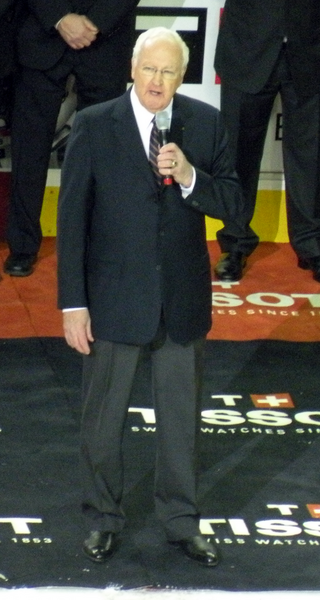
James Murray Costello is a Canadian retired ice hockey player, executive and administrator who dedicated a lifetime to the advancement of ice hockey in Canada. He played four seasons in the National Hockey League, and was the younger brother of Les Costello. He was a lawyer by trade, and was president of the Canadian Amateur Hockey Association from 1979 to 1994, then and its successor Hockey Canada from 1994 to 1998, when he facilitated the merger of the two organizations.
The Kitchener Greenshirts name has been used by five separate ice hockey teams playing in Kitchener, Ontario, Canada. These include one 'Senior A' level hockey team, two 'Junior A' level teams, and two 'Junior B' level teams. The name has also been used for a team in the Ontario Minor Hockey Association (OMHA).

The George Richardson Memorial Trophy was presented annually from 1932 until 1971, by the Canadian Amateur Hockey Association. It represented the Eastern Canada junior hockey championship, and a berth in the Memorial Cup final versus the Abbott Cup champion from Western Canada. The George Richardson Memorial Trophy was retired in 1971, when the Memorial Cup became a round-robin series between the winners of the three major junior hockey leagues in Canada; the Western Hockey League, the Ontario Hockey League and Quebec Major Junior Hockey League. The trophy was named for Captain George Taylor Richardson, a hockey player who died while serving in World War I.
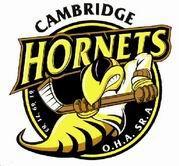
The Cambridge Hornets were a Senior "AAA" ice hockey team based out of Cambridge, Ontario. They played in the Ontario Hockey Association's Major League Hockey. The new Cambridge Hornets were brought into Southwestern Senior A Hockey League in 1999. They were members of the league in 2003 when it changed its name to Major League Hockey.
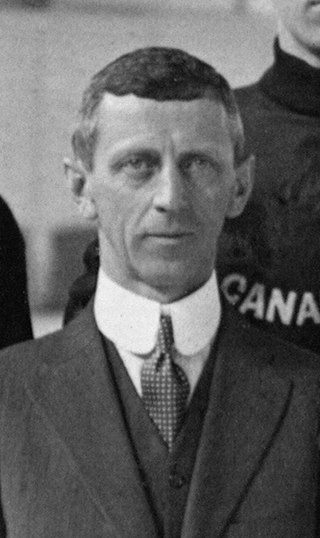
William Abraham Hewitt was a Canadian sports executive and journalist, also widely known as Billy Hewitt. He was secretary of the Ontario Hockey Association (OHA) from 1903 to 1966, and sports editor of the Toronto Daily Star from 1900 to 1931. He promoted the establishment of the Canadian Amateur Hockey Association (CAHA), then served as its secretary-treasurer from 1915 to 1919, registrar from 1921 to 1925, registrar-treasurer from 1925 to 1961, and a trustee of the Allan Cup and Memorial Cup. Hewitt standardized player registrations in Canada, was a committee member to discuss professional-amateur agreements with the National Hockey League, and negotiated working agreements with amateur hockey governing bodies in the United States. He oversaw referees within the OHA, and negotiated common rules of play for amateur and professional leagues as chairman of the CAHA rules committee. After retiring from journalism, he was the managing-director of Maple Leaf Gardens from 1931 to 1948, and chairman of the committee to select the inaugural members of the Hockey Hall of Fame in 1945.
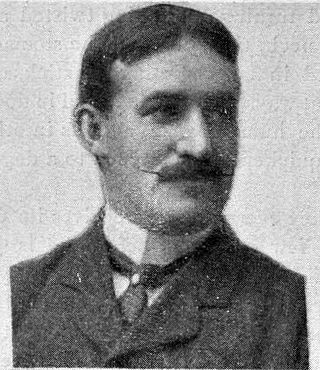
James Thomas Sutherland was a Canadian ice hockey administrator, and founding father of the game in Canada. Sutherland was a pioneer of hockey's early years, helping to develop amateur hockey, and spread the game's popularity throughout the country, and into the United States. He played in the inaugural season of the Ontario Hockey Association, and later coached and refereed the game. He founded the original Kingston Frontenacs, and later became president of the Ontario Hockey Association, and then the Canadian Amateur Hockey Association. He was instrumental in founding the Memorial Cup in 1919, and was at the forefront of the discussion on the origins of hockey.
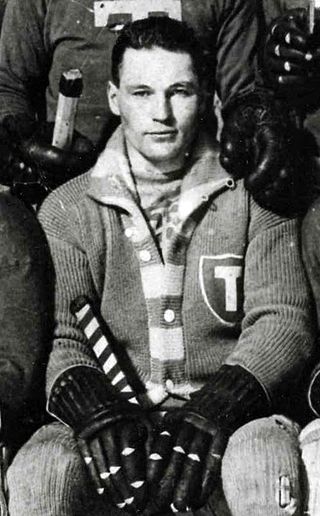
Allan McLean "Scotty" Davidson was a Canadian ice hockey player and soldier. He was considered one of the top wingers of the game's early years. He led his Kingston junior team to two Ontario Hockey Association championships in 1910 and 1911, when he moved to Calgary for the 1911–12 season and led the Calgary Athletics senior team to the Alberta provincial championship. Davidson turned professional with the Toronto Blueshirts in 1912 and was among the National Hockey Association's leading scorers the following two seasons. He captained Toronto to the Stanley Cup championship in 1914.

Blaine Nathaniel Sexton was a British ice hockey player who competed in the 1924 Winter Olympics and in the 1928 Winter Olympics. In 1916 he joined the Canadian Expeditionary Force and fought in the trenches of France on the Western Front during World War I. After the war he was instrumental in not only expanding Ice Hockey in the United Kingdom but across Europe. Known in Europe as B.N.Sexton he was inducted into the UK Hockey Hall of fame in 1950.
The Winnipeg Maroons were a senior ice hockey team based in Winnipeg, Manitoba, Canada.

The Windsor Swastikas were a Canadian ice hockey team in Windsor, Nova Scotia, from 1905–1916. Not to be confused with the Fernie Swastikas across the country in British Columbia, the “Swastikas” was chosen by them as swastika is also a symbol of luck and success.

Wilfred "Boomer" Harding was a Canadian multi-sport athlete. He was best known as a baseball player with the Chatham Coloured All-Stars, and was the first Black player in the International Hockey League.
References
- 1 2 3 4 Clinton, Jared (November 11, 2014). "Remembering the Four Hockey Hall of Famers Who Lost Their Lives in World War I". The Hockey News .
- ↑ Valor awards for Michael J. Hayes | Military Times Hall of Valor
- 1 2 Duff, Bob (November 9, 2016). "Windsor's Joe Turner made ultimate sacrifice". Windsor Star .
- ↑ "Fallen Canadians with ties to hockey: 1944". Veterans Affairs Canada.
- ↑ "Norbert John Sterle". Veterans' Memorial Project. Retrieved May 5, 2021.